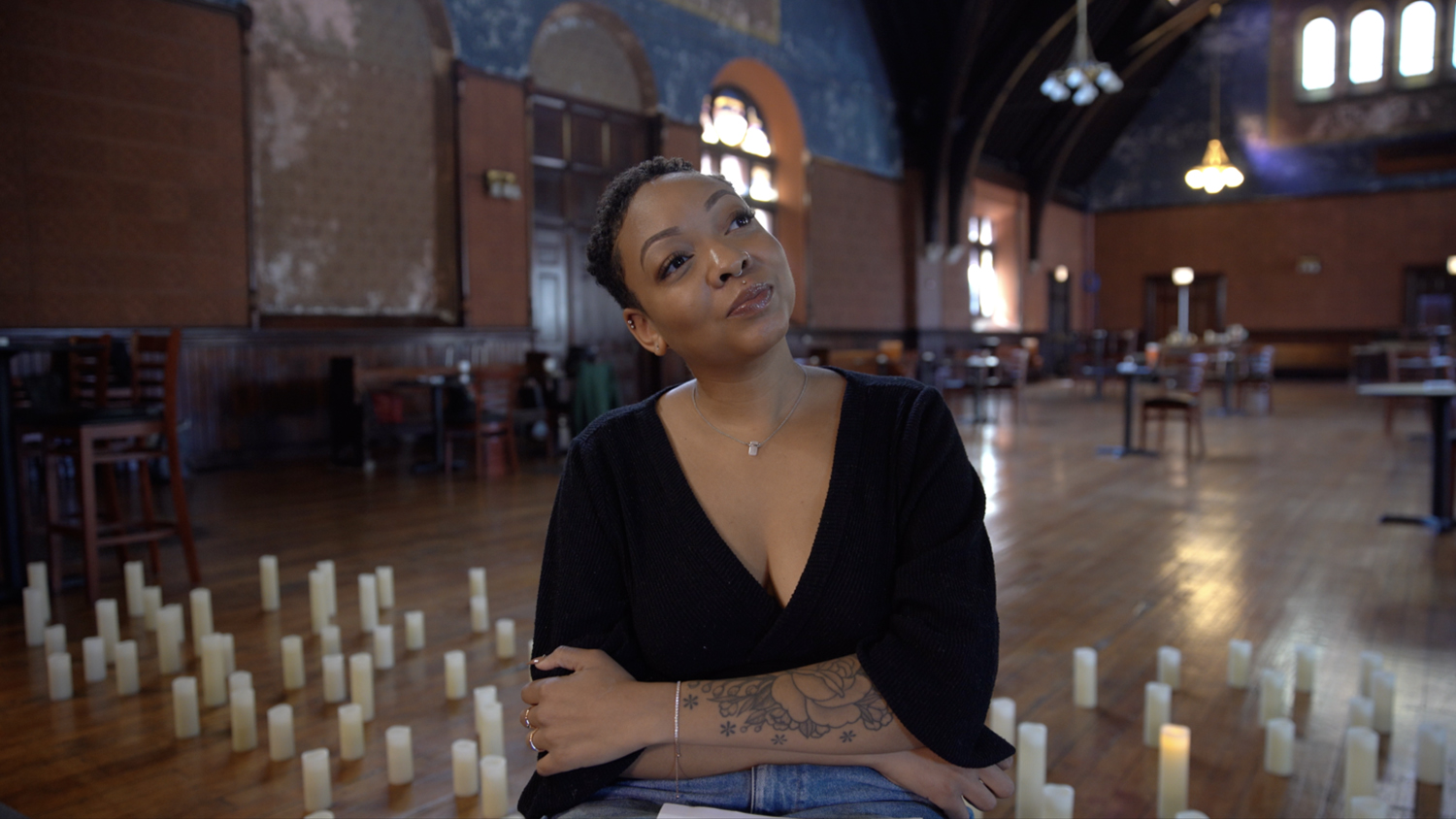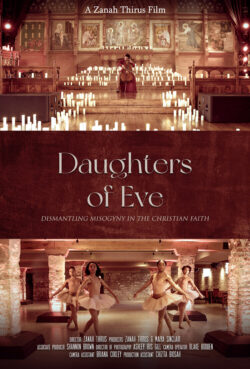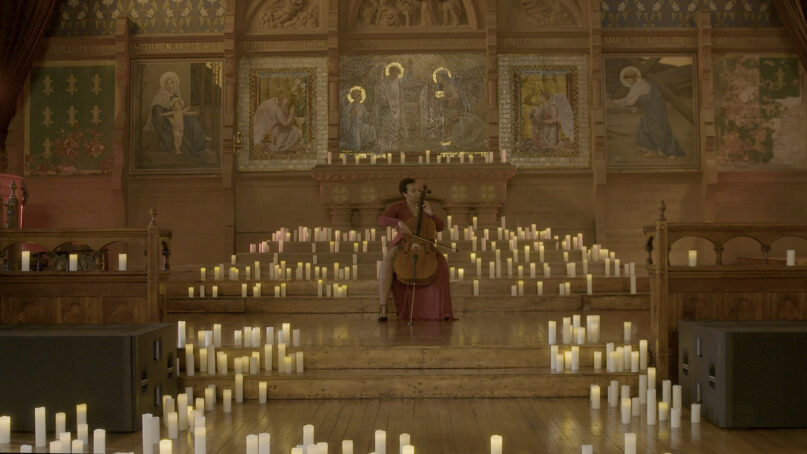(RNS) — Zanah Thirus’ latest film, “Daughters of Eve,” has a very specific goal: Dismantle the Christian patriarchy.
Raised in a Black Apostolic church in Chicago’s south suburbs, Thirus was active in her nondenominational church’s youth group and homeschooled until attending college at age 14. Today, she’s a Black Christian feminist who often feels caught between what she sees as the misogyny, homophobia and racism of the church on the one hand and the “religion-bashing” and whiteness of many feminist spaces.
“That’s something that definitely inspired me to make this film,” said Thirus. “I made it for the anomalies, for those who are against patriarchy and misogyny, but also have a heart for God and lean into their faith from a nonoppressive perspective.”
Filmed at Epiphany Center for the Arts in Chicago, her one-hour, mixed media documentary features music and dance among the interviews with pastors, evangelists, therapists and scholars. These experts discuss everything from Jesus’ feminism to sexual violence in the church.
Thirus’ previous documentary, “Unlearning Sex,” won the Toronto International Women’s Film Festival award in 2020, and her film “Black Feminist” earned the International Black & Diversity Film Festival’s Jury Award for best U.S. documentary in 2021. Screenings for “Daughters of Eve,” created to be viewed in churches and divinity schools, may be requested at the film’s website.
Religion News Service spoke to Thirus about the inspiration for the documentary and the possibilities for nonpatriarchal Christianity. This interview was edited for length and clarity.
What sort of messages did you grow up hearing about what it meant to be a Christian woman?
Purity, I think, was the biggest thing. I was constantly preached to about saving myself for marriage, that sex will lead to pregnancy, STDs or going to hell. But we also had no sex education. So it was like, what really is sex? My first experience sharing my body with someone was through assault, and I had no idea.
It took years of moving through that, learning about consent and trauma. I had to unlearn everything I had been taught about sex, and a lot of that started with who my body belonged to, and ideas about sin and purity.

Filmmaker Zanah Thirus in “Daughters of Eve.” Courtesy photo
That’s a very common story for women in the church. We’re taught about what not to do, but we’re not actually taught about autonomy or given the space to understand that sexual pleasure is a good thing.
Why did you name your film “Daughters of Eve”?
My mom would always read us the Bible, and we’d talk about Cain and Abel, and I would be like, where are the daughters? I started to understand the lack of agency that woman had. I hated the story of Esther — she never asked for any of this. Or Bathsheba. Why did David have access to her in that way?
So my thought was, if Eve had daughters, what would their experience be like? What if this story was told, from the beginning of time, as centered around women?
This film critiques the narrative that Eve is responsible for the downfall of creation. Why do the stories we tell about Eve matter?
Eve is the first story in the Bible about a woman. It is a basis for how so many Christians center their beliefs about women’s purpose and identity. There is so much of the notion that Eve was created for Adam, that women are created for men, and from a man. The thought that all women are for men, and our purpose is rooted in men, it’s very limiting to what I think God’s overall intention is.
RELATED: Women breaking through to top roles in Black churches
The way I like to look at it is, the earth was not complete without Eve. In the film we talk about dominion and submission, words often taken out of context. But she was the crown jewel of creation, and life couldn’t move forward without her. The punishment of Adam ruling over her and of childbearing being painful was never the original intention, but a punishment for disobedience.
The documentary addresses troubling stories of sexual violence. How do you think Christians ought to interpret these stories?
First and foremost, pastors and anybody in leadership are responsible for the care of their congregation. I think it’s very irresponsible to say, just dive into the Word of God. This is a book that can be very triggering and can cause harm if people are not given the proper tools.

Poster for “Daughters of Eve.” Courtesy image
Pastors need to be informed about the potential traumas their congregations have faced. Churches are filled with survivors of some sort of sexual violence. You don’t know how you could be triggering. Claire Horner, one of the therapists in the film who specializes in toxic religion, talks about the importance of pastors being trained in sexual violence or having a consultant for their sermons. It’s OK to start sermons with a trigger warning.
What should lay people do with the sexual violence in the Bible? Is knowing the historical context enough to explain it away?
The fact of the matter was that at the time, women were property. They were literally owned by their husbands and fathers. That’s a harsh reality, but anybody going through Scripture who wants to dismantle misogyny needs to understand that.
RELATED: Women are essential in the Bible. Now they’re in the Sunday readings
A lot of times, the Bible isn’t telling you what’s right or wrong, it’s telling you what happened. It’s recounting a story. Just because a man sold two daughters, that’s not telling you that’s the right thing to do, that’s telling you what happened. People will take stories and make them relevant today in a way that is harmful and violent. It’s helpful to look at the Bible for inspiration around how people survived, or how God showed up in these scenarios, not necessarily taking the things people are doing as law.
Would you say the Bible is ultimately a liberating text for women?
It can be, but as a survivor of sexual violence and as somebody who grew up in a very misogynistic church and religion overall, I found my empowerment through research and understanding outside of what my pastor or leaders in the church were telling me to believe. I think people are very flawed, and I think patriarchy is a result of power. It’s a system in place to maintain the power of men, but it’s not God-ordained. It never has been. Looking at Christianity through that lens, that’s when I found my faith to be liberating.
“Daughters of Eve” trailer from Zanah Thirus on Vimeo
You’ve called this film a love letter to your younger self. What is one thing you wish you could tell your younger self?
“What you’re feeling isn’t wrong.” I used to be livid when I would hear misogynistic sermons, even before I had the terms feminism, misogyny, womanism or autonomy. I didn’t have the tools I do now, but there was something so infuriating about hearing sermons about women being in their place, or submission. I’d tell my younger self, that rage is righteous. The way these things are preached is not how God intended things to be.
As we approach Christmas, do you have advice for ways that Christians can dismantle misogyny in their churches as they reflect on the birth of Christ?
Remember that Christ, the savior of the world, came to this world without the help of a man. Also, Mary was an unwed teenage mom who wasn’t white. So let’s think about how God chose to show up and what we’re really celebrating.





